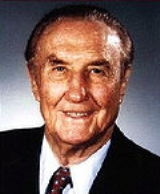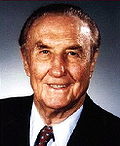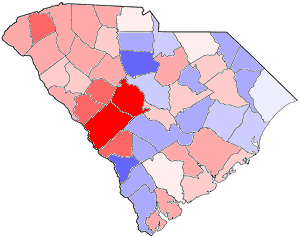
United States Senate election in South Carolina, 1996
Encyclopedia

United States Senate
The United States Senate is the upper house of the bicameral legislature of the United States, and together with the United States House of Representatives comprises the United States Congress. The composition and powers of the Senate are established in Article One of the U.S. Constitution. Each...
from the state of South Carolina
South Carolina
South Carolina is a state in the Deep South of the United States that borders Georgia to the south, North Carolina to the north, and the Atlantic Ocean to the east. Originally part of the Province of Carolina, the Province of South Carolina was one of the 13 colonies that declared independence...
. Popular incumbent Republican
Republican Party (United States)
The Republican Party is one of the two major contemporary political parties in the United States, along with the Democratic Party. Founded by anti-slavery expansion activists in 1854, it is often called the GOP . The party's platform generally reflects American conservatism in the U.S...
Senator Strom Thurmond
Strom Thurmond
James Strom Thurmond was an American politician who served as a United States Senator. He also ran for the Presidency of the United States in 1948 as the segregationist States Rights Democratic Party candidate, receiving 2.4% of the popular vote and 39 electoral votes...
won re-election against Democratic
Democratic Party (United States)
The Democratic Party is one of two major contemporary political parties in the United States, along with the Republican Party. The party's socially liberal and progressive platform is largely considered center-left in the U.S. political spectrum. The party has the lengthiest record of continuous...
challenger Elliott Springs Close.
Democratic Primary
The South Carolina Democratic PartySouth Carolina Democratic Party
The South Carolina Democratic Party is the South Carolina affiliate of the United States Democratic Party. The Democratic party thrived during the Second Party System between 1832 and the mid-1850s and was one of the causes of the collapse of the Whig Party....
held their primary
Primary election
A primary election is an election in which party members or voters select candidates for a subsequent election. Primary elections are one means by which a political party nominates candidates for the next general election....
for governor on June 11, 1996. Elliott Springs Close, a 43-year old political novice from Columbia
Columbia, South Carolina
Columbia is the state capital and largest city in the U.S. state of South Carolina. The population was 129,272 according to the 2010 census. Columbia is the county seat of Richland County, but a portion of the city extends into neighboring Lexington County. The city is the center of a metropolitan...
, entered the Democratic primary and faced token opposition from black photographer Cecil J. Williams. Close was a wealthy heir of a textile business, a brother-in-law of President Clinton's
Bill Clinton
William Jefferson "Bill" Clinton is an American politician who served as the 42nd President of the United States from 1993 to 2001. Inaugurated at age 46, he was the third-youngest president. He took office at the end of the Cold War, and was the first president of the baby boomer generation...
chief of staff
White House Chief of Staff
The White House Chief of Staff is the highest ranking member of the Executive Office of the President of the United States and a senior aide to the President.The current White House Chief of Staff is Bill Daley.-History:...
Erskine Bowles
Erskine Bowles
Erskine Boyce Bowles is an American businessman and political figure from North Carolina. He served from 2005 to 2010 as the President of the University of North Carolina system...
, who styled himself as a fiscal conservative and a social moderate. Even though he proclaimed himself as such, he took positions that would align himself with the liberal wing of the Democratic party. Close would not have voted to balance the budget, he agreed with the Don't ask, don't tell
Don't ask, don't tell
"Don't ask, don't tell" was the official United States policy on homosexuals serving in the military from December 21, 1993 to September 20, 2011. The policy prohibited military personnel from discriminating against or harassing closeted homosexual or bisexual service members or applicants, while...
policy of the military initiated by Clinton and he supported continuing welfare as a federal entitlement program.
| Democratic Primary | ||
|---|---|---|
| Candidate | Votes | % |
Republican Primary
The South Carolina Republican PartySouth Carolina Republican Party
The South Carolina Republican Party and the South Carolina Democratic Party are the two major political parties within the U.S. state of South Carolina...
held their primary
Primary election
A primary election is an election in which party members or voters select candidates for a subsequent election. Primary elections are one means by which a political party nominates candidates for the next general election....
on June 11, 1996 and the contest pitted 93-year old incumbent Senator Strom Thurmond against two relatively unknown candidates. Secretary of State
Secretary of State of South Carolina
The Secretary of State of South Carolina is an elected position in the U.S. state of South Carolina.-Organization:The Secretary of State's office has four internal divisions:...
James Miles was the only Republican statewide official who had not endorsed Strom Thurmond and it was rumored that he was considering entering the primary. Thurmond's press secretary, Mark Goodin, criticized Miles for not endorsing Thurmond and told those who contributed to Miles campaign fund that they were contributing to a contest against Thurmond, not the state's other Senator, Democrat Fritz Hollings
Ernest Hollings
Ernest Frederick "Fritz" Hollings served as a Democratic United States Senator from South Carolina from 1966 to 2005, as well as the 106th Governor of South Carolina and Lt. Governor . He served 38 years and 55 days in the Senate, which makes him the 8th-longest-serving Senator in history...
. Miles soon endorsed Thurmond which left Harold G. Worley, a state representative
South Carolina House of Representatives
The South Carolina House of Representatives is the lower house of the South Carolina General Assembly, the upper house being the South Carolina Senate. It consists of 124 Representatives elected to two year terms at the same time as US Congressional elections...
from Myrtle Beach
Myrtle Beach, South Carolina
Myrtle Beach is a coastal city on the east coast of the United States in Horry County, South Carolina. It is situated on the center of a large and continuous stretch of beach known as the Grand Strand in northeastern South Carolina. It is considered to be a major tourist destination in the...
, and Charlie Thompson, an educator from Charleston
Charleston, South Carolina
Charleston is the second largest city in the U.S. state of South Carolina. It was made the county seat of Charleston County in 1901 when Charleston County was founded. The city's original name was Charles Towne in 1670, and it moved to its present location from a location on the west bank of the...
, as the only opponents to Thurmond's election. Worley spent $600,000 of his own money and based his campaign almost solely on Thurmond's age. He questioned Thurmond's mental ability to make decisions and whether he had the capacity to fill out a full term, which would put Thurmond at 100-years old. Nevertheless, Thurmond cruised to a primary victory and Worley only carried Horry County
Horry County, South Carolina
Horry County is a county located in the U.S. state of South Carolina. This name honored Revolutionary War Hero, Peter Horry. Brigadier General Horry was born in South Carolina sometime around 1743 and started his distinguished military career in 1775 as one of 20 captains the Provincial Congress...
.
| Republican Primary | ||
|---|---|---|
| Candidate | Votes | % |
General election campaign
The race between Thurmond and Close boiled down to whether Thurmond could retain the affection of voters who had re-elected him over and over or whether Close could convince the voters that Thurmond's age was an impediment to effective service for the state. Thurmond therefore adopted a non-confrontational approach to the campaign. He chose to not debate Close, not only because he had not debated an opponent since Olin D. JohnstonOlin D. Johnston
Olin DeWitt Talmadge Johnston was a Democratic Party politician from the US state of South Carolina. He served as the 98th Governor of South Carolina, 1935–1939 and 1943–1945, and represented the state in the United States Senate from 1945 until his death in 1965.-Early Life, Military Involvement,...
in the 1950 Senate election
United States Senate election in South Carolina, 1950
The 1950 South Carolina United States Senate election was held on November 7, 1950 to select the U.S. Senator from the state of South Carolina. Incumbent Democratic Senator Olin D...
, but also because it would only emphasize the 50-year age difference between the candidates. Thurmond energetically traversed the state greeting the voters and pointed out to them that with his experience, he could more effectively serve the state than a political neophyte.
Close ran television advertisements that highlighted the age issue by declaring that although Thurmond had admirably served the state for over fifty years, it was time for someone new to represent South Carolina. He poured almost a million dollars into his campaign, but his campaign never remained focus. For instance, trying to not appear too wealthy, Close traded his fancy foreign car for a Cadillac
Cadillac
Cadillac is an American luxury vehicle marque owned by General Motors . Cadillac vehicles are sold in over 50 countries and territories, but mostly in North America. Cadillac is currently the second oldest American automobile manufacturer behind fellow GM marque Buick and is among the oldest...
. He acquired a speeding ticket in the Cadillac and a newspaper criticized him for driving a luxury automobile. Frustrated, Close then switched his Cadillac for a Buick. Another instance of his jumbled campaign came when said that his family's textile factories did not lay off an employee during the Great Depression. Yet a week after this statement, three mills were closed and 850 employees were out of work.
By the day of the election on November 5, polls had shown that the voters thought it was time for Thurmond to retire, but they did not want to throw him out of office. Close spent almost a million dollars of his fortune to defeat Thurmond and his decision to raise a million dollars from outside sources was attacked by the Thurmond campaign of a lack of confidence by Close in his own campaign. Thurmond spent a little more than $2.6 million on the race and was said to have "dodged the bullet" by The State reporter Lee Bandy after his victory. The campaign aides of Thurmond stated he could have been defeated had either former Governor
Governor of South Carolina
The Governor of the State of South Carolina is the head of state for the State of South Carolina. Under the South Carolina Constitution, the Governor is also the head of government, serving as the chief executive of the South Carolina executive branch. The Governor is the ex officio...
Richard Riley
Richard Riley
Richard Wilson Riley , American politician, was United States Secretary of Education under President Bill Clinton and the 111th Governor of South Carolina. He is a member of the Democratic Party....
or 5th district congressman
South Carolina's 5th congressional district
The 5th Congressional District of South Carolina is a congressional district in northern South Carolina bordering North Carolina. It includes all of Cherokee, Chester, Chesterfield, Darlington, Dillon, Fairfield, Kershaw, Lancaster, Marlboro, Newberry and York counties and parts of Florence, Lee...
John M. Spratt, Jr.
John M. Spratt, Jr.
John McKee Spratt, Jr. is the former U.S. Representative for , serving from 1983 until 2011. He is a member of the Democratic Party. Spratt was the dean of the South Carolina congressional delegation, chairman of the U.S. House Committee on the Budget, and the second ranking Democrat on the U.S...
run against him.
Election results
| colspan=5 |Republican
Republican Party (United States)
The Republican Party is one of the two major contemporary political parties in the United States, along with the Democratic Party. Founded by anti-slavery expansion activists in 1854, it is often called the GOP . The party's platform generally reflects American conservatism in the U.S...
hold
|-

See also
- List of United States Senators from South Carolina
- United States Senate elections, 1996United States Senate elections, 1996The 1996 elections to the United States Senate coincided with the 1996 presidential election, in which Democrats Bill Clinton and Al Gore were reelected President and Vice President of the United States, respectively....

